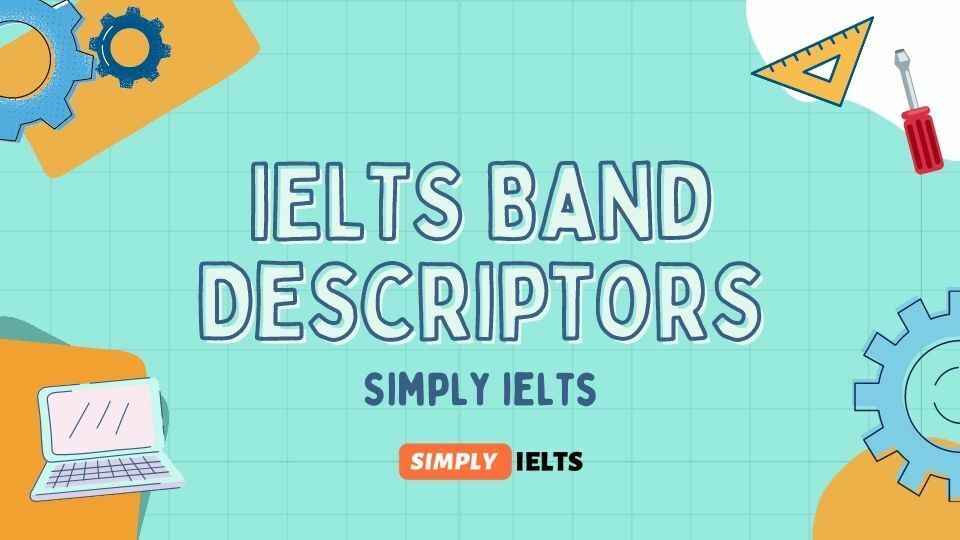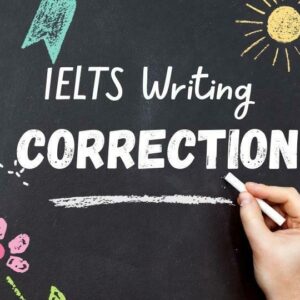
IELTS Band Descriptors and IELTS assessment criteria for Writing and Speaking
What is the meaning of IELTS assessment criteria and IELTS band descriptors?
First of all, these are the assessment criteria for IELTS Writing and Speaking.
For Listening and Reading, everything is simple – the score depends on the number of correct answers. you can review it in this lesson.
The criteria for IELTS Writing are more sophisticated. There are official so-called IELTS Band Descriptors (Band is a score), by which you can understand what, how and where is required, and for what score. They are available in the public domain to the whole world, so that candidates know what’s what.
There is Band Descriptors IELTS Writing task 1 and a separate criterion for an essay – Task 2.
IELTS Writing band descriptors
Evaluation Criteria for IELTS Writing Task 1
1. TASK ACHIEVEMENT
How did you answer the question of the task and how fully did the task. For example, did they write 150 words, did they include comparisons, did they write about the graph that was drawn in the task? Have you described the main trends or not?
2. COHERENCE/COHESION
Coherence, consistency, integrity of presentation, unity and logic. Here your ability to logically and consistently, as well as coherently convey to the reader, is evaluated. Is what you have written easy to read? Can your ideas be understood or are they so chaotic and scattered here and there that the examiner needs to re-read several more times to figure it out?
3. LEXICAL RESOURCE
It’s about your vocabulary and its diversity: do you use synonyms or write the same words? Simple words or more difficult? How correctly and flexibly do you use them? Do they sound natural or far-fetched?
4. GRAMMATICAL RANGE / ACCURACY
Grammar of course! And correctness. Is it full of errors, due to which it is impossible to understand what is written, or most of the sentences are without errors? Simple short sentences or complex / complex? Does the present simple float everywhere or are there various designs? Passive voice or something more advanced like the conditional mood?
Evaluation Criteria for IELTS Writing Task 2 (Essay):
For IELTS writing task 2, IELTS assessment criteria are the same as above, BUT the first one is different:
1. TASK RESPONSE
It’s about how you answer all parts of the task, is your point of view clear? How much will you explain your main ideas, supporting them with examples, or just write everything separated by commas? Do you write about the topic in the assignment or what you want? Maybe not at all … or vice versa, do you clearly answer the question posed and everything is on topic?
OTHER evaluation criteria are the same as in Part 1:
2. COHERENCE/COHESION
3. LEXICAL RESOURCE
4. GRAMMATICAL RANGE / ACCURACY
Each criterion has its own description for points 1-0. For example, in an essay, to get 7.0 out of 9.0 for the GRAMMATICAL RANGE/ACCURACY criterion, you need to:
- Use a sufficient range of vocabulary to allow some flexibility and precision
- Use less common lexical items with some awareness of style and collocation
- May produce occasional errors in word choice, spelling and/or word formation
ALL criteria and IELTS Band descriptors of the requirements for each point that can be obtained:
IELTS Speaking band descriptors
Here, as well as the written part, there are 4 IELTS speaking assessment criteria:
Evaluation Criteria for IELTS Speaking
1. FLUENCY / COHERENCE
Fluency of speech: pauses, hesitations with reflections, or do you express ideas easily and naturally? Are your answers one-word or detailed and detailed? Do you blast English speech at the examiner, or yes/no answers.
This also includes the logic of your answer with the coherence of the presentation: do you present it logically? Does it all make sense or are you jumping from one idea to another? Do you repeat ideas and correct yourself in every sentence?
KEY: Do you think about words or grammar, for your ideas or not? If you think about the language, choosing words, it will most likely be 6.0 or 6.5. But if you speak NOT thinking about the words, and effectively and imperceptibly rephrase your remarks, if you forgot something, this is 7 and above.
For a score of 7.0 for this criterion, you need:
– Speak at length without noticeable effort or loss of coherence
– Use a range of connectives and discourse markers with some flexibility
– Can: demonstrate language-related hesitation at times, or some repetition and/or self-correction
2. LEXICAL RESOURCE
As well as in the written part, this criterion is about the use of various words and phrases, idiomatic constructions that are less common (less common and idiomatic vocabulary); paraphrasing. Here, how accurate are the words you use to convey this or that meaning. For example, do you write things, stuff (general words) or more precise – devices, gadgets, goods, jewelery, etc.
It is also important here that for a score above 7.0, you need to use a variety of words according to the topics, questions, topics that the examiner gives / asks. For example, if you were asked about the weather, for a high score you need to say words that clearly describe exactly different weather phenomena, rather than general words – pouring rain, drizzling, scorching.
3. GRAMMATICAL RANGE / ACCURACY
Here grammar is evaluated, its diversity and complexity of grammatical constructions. Also how correct are the constructs you are using.
4. PRONUNCIATION
This IETLS Speaking evaluation criterion is about your pronunciation: do you pronounce what you say correctly or with errors? How much does it sound natural and natural or like a robot? Here and intonations, how diverse are they or is everything monotonous?
Here, as well as in the written part, there are official Band Descriptors for IELTS speaking – a description for each criterion and score:
Source: IELTS.org





Responses